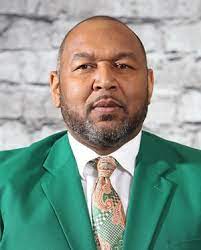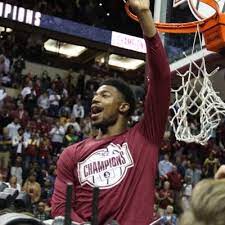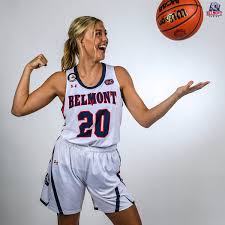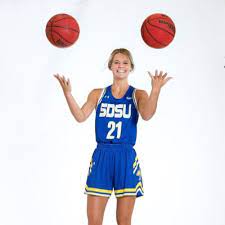1 reason that mid-majors have a hard time competing with the big boys is due to their lack of big men, but the Rattlers could board with the best of them in the 1970s after recruiting Clemon Johnson. The 6’10”, 240-pound center had almost 1500 career REB in college, then became a top-25 draft pick and spent a decade in the NBA, joining the 76ers just in time to win a title in 1983. In 2011 he returned to his alma mater as head coach and spent 3 years on the sideline. HoopsHD’s Jon Teitel got to chat with Clemon about being a great rebounder and winning an NBA title. Today is Clemon’s 65th birthday so let us be the 1st to wish him a happy 1!
Why did you choose to attend Florida A&M? At the time there were not many major D-1 programs that were fully-integrated. I had a few West Coast offers but the FAMU campus was across the street from me in Tallahassee.
You still hold school records for most rebounds in a game (25) and a career (1494): did you realize at the time how prolific a player you were, and what is your secret for rebounding? I did not realize it until my senior year: I wish they had kept track of blocked shots because I would have had that record too! It is just about positioning and chasing it down, like Dennis Rodman did. You need to have the desire and eagerness, which I did because I wanted to be the best.
You earned a B.S. in Economics and later a Master’s in Physical Education: what value do you place on education, and how have your 2 degrees helped your career? The B.S. degree came about as a promise I made to my father. I had about 16 more hours to go before I could graduate, but after I went to the NBA I did not think I needed it because I was a grown man who was making money. However, my dad kept asking me over and over why I did not have my degree, so I just finally told him that I would do it. When I talk to young kids today I explain to them that even if they are good enough to go pro and make a lot of money, 1 bad investment can cost you all of it. I decided to continue with my education if I did not get another coaching job, so that is why I got my masters.
In the summer of 1978 you were drafted in the 2nd round by Portland (8 spots behind your future NBA teammate Mo Cheeks), which you allegedly learned when a sportswriter called to ask you about it while you were mowing the lawn at your mother’s house: is that true, and what did it feel like to learn that you were drafted? It was a true story! You have to remember that this was in the 1970s: the draft was about 13-14 rounds back then and nobody had told me in advance that I was going to get drafted. I will never forget it: the writer’s name was Barry Cooper. I knew I still had to go out and compete for the job so I tried not to get overly excited, but I was totally pleased and immediately called everyone that I knew.
In 1983 you joined Philadelphia in midseason and stuck around to win an NBA title as your team went 12-1 in its 3 playoff series: what did it mean to you to win the title, and what was the reaction like in Philly? I understand what people mean when they say how important it is to get a ring: it symbolized that I was part of the best team in the world. The city went crazy and I went crazy along with them. My normal summer routine was to go out and start training once the season was over, but the celebration that summer never stopped and it cut into my practice/training time. I went back to Florida but still had to make a ton of appearances down there. In the playoffs I caught myself out on the floor just standing around and watching Dr. J and Moses Malone: I just tried to get out of their way so they could do their thing. Dr. J pulled me aside the next day and told me to just go out there and play basketball because he would let me know if I got in the way. The playoffs give you a whole different heartbeat: it is racing because it is as they say: “win or go home”.
What are your memories of Game 7 of the 1986 Eastern Conference Semifinals (you lost to Milwaukee by 1 PT when Dr. J missed a short jumper with 3 seconds left)? I became close friends with Milwaukee’s Alton Lister: he was just wearing us out. We went to the money man: I thought Dr. J’s shot was going in but it just did not fall. The whole year was a struggle: Moses missed the playoffs due to an eye injury.
You averaged 5.4 PPG/4.6 RPG during your 10-year NBA career: how satisfied are you with your career? I have to be pleased with it because the numbers are what they are. I was given an opportunity and did the best I could to be a role player. I keep trying to explain that to the young kids: I was never a star but I hung around for a decade and won a ring by being part of a team.
After retiring from the NBA, you played professionally in Italy for 5 years: what did you learn from this experience, and how did it compare to the NBA? I learned that Micheal Ray Richardson is a comedian! He is a great guy…but I got into more altercations following Mike because he hated to lose. Mike and I felt like the refs in Italy were not giving us a fair shake. I thought it was an outstanding league and a great opportunity for guys who cannot make it in the NBA to continue their career.
After retiring from professional basketball you became a high school coach in Gaston County (winning 7 district titles in 8 years), and then a college coach at Alaska-Fairbanks and your alma mater: what is the biggest difference between coaching college players vs. high school players? It is similar off the court in terms of making sure the guys go to class and do their work. The basketball IQ of the college players is not necessarily higher but their athleticism definitely is. The key is to find a formula that allows your players to be effective.
Your son Chad played basketball at Pitt: what was it like to have him follow in your large footsteps? I thought that if he was more of an extrovert then he would have been a better player, but instead he shied away from the spotlight. I was an introvert as well but I felt like the basketball court was my domain. I could care less if he follows in my footsteps: I just want to push him without discouraging him. At 6’5” he was a center in high school but a guard in college, so he had to learn a whole new set of skills. He would like to pursue a coaching career and I am hopeful that 1 day he will be my assistant coach on the collegiate level. We can sit around and break a game down over the phone: we are both on the same page because we both have a high basketball IQ.








